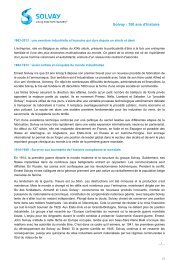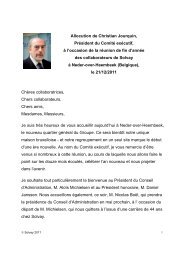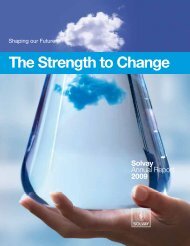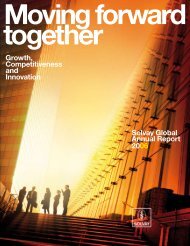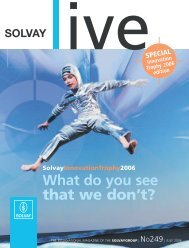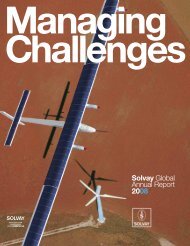THE FUTURE, - Solvay
THE FUTURE, - Solvay
THE FUTURE, - Solvay
You also want an ePaper? Increase the reach of your titles
YUMPU automatically turns print PDFs into web optimized ePapers that Google loves.
209541<br />
THROUGH <strong>THE</strong> WALL AGAIN?<br />
YES WE CAN!<br />
The right quality<br />
at the right price<br />
<strong>THE</strong> PROJECT. It all started with client surveys<br />
conducted in 2003 and 2006, which showed that<br />
in the business of allylic products (used for<br />
producing epoxy resins) <strong>Solvay</strong>’s performance<br />
is well above that of its competitors.<br />
Hence the question: in this typically commodity<br />
business, are we not offering “over-quality”,<br />
in other words generating unnecessary<br />
performance in the eyes of the client, that he<br />
is not willing to pay for, and resulting for us in<br />
costs that could be avoided?<br />
It is not easy to sell such an idea into a company<br />
that for many years has been cultivating<br />
excellence.<br />
The matter was referred to 35 managers from all<br />
disciplines and all continents and the result was:<br />
yes, there are multiple opportunities to drastically<br />
reduce these costs of “over-quality” in almost all<br />
production and support processes.<br />
Activated for the fi rst time in 2003, the 2009<br />
“over-quality” cost reduction program has been<br />
an excellent opportunity to adapt to the current<br />
economic crisis. Specifi cally, in 2009 the<br />
equivalent of EUR seven million a year has been<br />
saved in this way, and ultimately we can expect<br />
an annual recurring gain of EUR 10 million.<br />
SBU EDS<br />
> Bruno Jestin; Pedro Aguiar;<br />
Mangkonkarn Boonchana; Michel Friesewinkel;<br />
Fabienne Georges; Michael Klumpe; Philippe Krafft;<br />
Hellen Pham; Moura Pinto; Christine Roy;<br />
Arnaud Valenduc; Alain Vanstrydonck.<br />
209908<br />
MODULAR APPROACH FOR PLASTIC FUEL<br />
TANK WELDING MACHINES TO REDUCE BY<br />
A FACTOR OF FOUR CAPITAL EXPENDITURE<br />
IN LOW-COST COUNTRIES<br />
Standardization<br />
for bespoke manufacturing<br />
<strong>THE</strong> PROJECT. The manufacture of plastic fuel<br />
tanks ends with a fi nishing stage of fi nal cutting<br />
and welding. The procedures and corresponding<br />
machinery are decisive to the economics of the<br />
overall process.<br />
In a fi rst step, a multicultural group of employees<br />
defi ned standard working conditions: that is a<br />
common way of designing, building and using<br />
equipment. This is the heart of the business<br />
that guarantees all customers the same levels<br />
of reliability, quality and safety anywhere in<br />
the world.<br />
In a second step, all these data were used to<br />
defi ne three different levels of equipment and<br />
machinery, depending on the prevailing cost<br />
structure. Thus three types of machinery, with<br />
very different levels of automation, permit an<br />
optimization of total costs: the most automated<br />
– and expensive – machines in high labour cost<br />
countries, the simplest machinery where cheaper<br />
labour permits.<br />
This division respects in every case the<br />
requirements of human safety and workplace<br />
ergonomics. It systematically includes risk<br />
analyses, process control parameters and training.<br />
It allows Inergy to optimize its investments and<br />
also reduce engineering costs, lower the<br />
time-to-production of new programs, be more<br />
effective in problem-solving and maintenance and<br />
fi nally, reduce the costs of poor quality.<br />
SBU INERGY<br />
> Stéphane Toutain; Philippe Convain;<br />
Denis Jacqmart; Alain Potier; Arnault Thiebaut.<br />
<strong>Solvay</strong> <strong>Solvay</strong> live live - JUILLET - JULY 2009 - 59



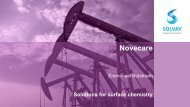
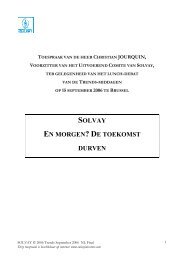
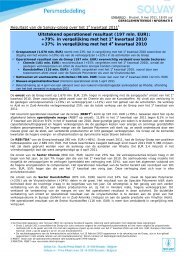
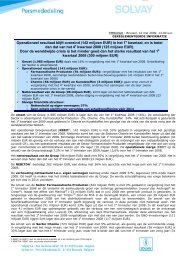

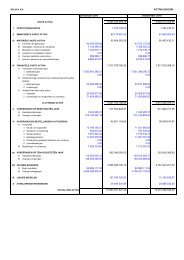
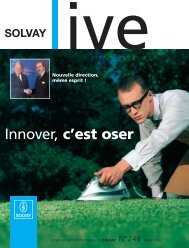
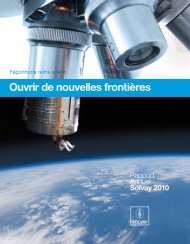
![PROC.1 [LETTRE] - Solvay](https://img.yumpu.com/16585746/1/184x260/proc1-lettre-solvay.jpg?quality=85)
